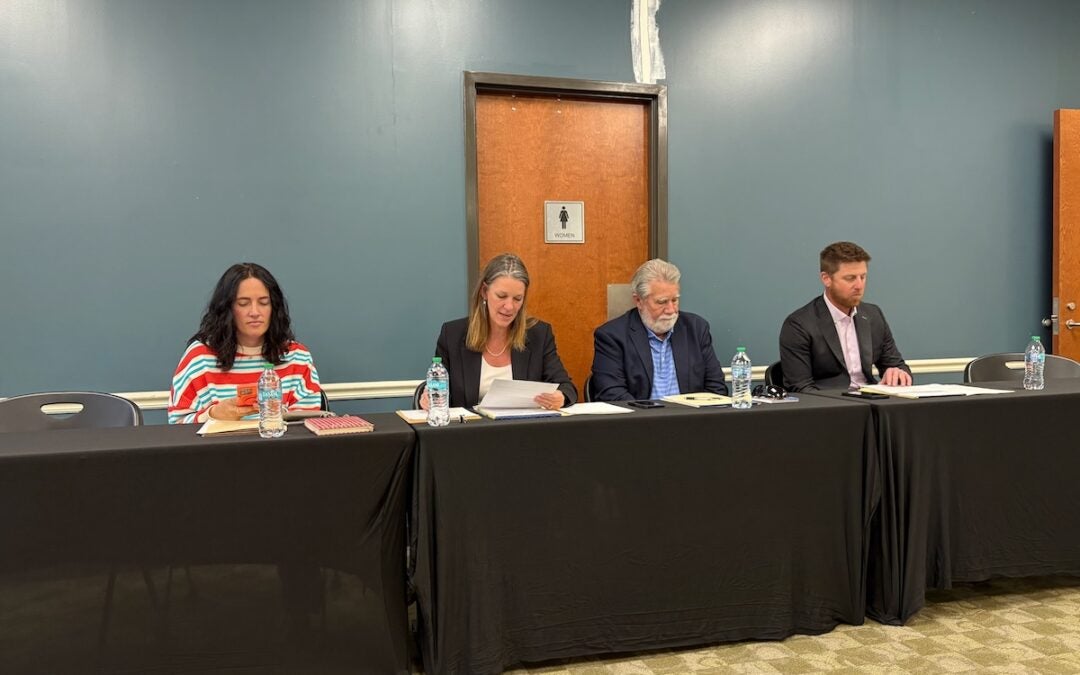The contract between Columbia County and Gold Cross EMS is up for discussion by the Columbia County Board of Commissioners.
During the recent Community and Emergency Services Committee meeting, committee members heard from Fire Chief Jeremy Wallen about the contract, which is on an automatic two-year renewal. He said Gold Cross had two options they would like considered.
“Option 1 would be to increase the subsidy from $850,000 a year to $975,000 and maintain current staffing,” Wallen said. “Columbia County assumes responsibility for EMS dispatching. This will go into effect Jan. 1, 2024. Option 2 is to reduce the subsidy from $850,000 to $750,000, Columbia County assumes responsibility for EMS dispatching and will go into effect Jan. 1, 2024, removal of requirement of QRV (quick response vehicles), reassignment of the shift supervisor to EMS Director on an eight hour Monday through Friday shift between 8 a.m. and 5 p.m.”
Vince Brogdon, CEO of Gold Cross, spoke to committee members about the current situation and how things have changed since the QRVs were first brought into use.
“Looking at our current situation, it was different several years ago when we came up with the QRVs because we were lacking paramedics,” Brogdon said. “So, in order to move those resources over and keep the ambulances up, and we had plenty of EMT openings then or plenty EMTs to put the trucks up, at that time the structure was the way it needed to be. Now things have changed again, to where now we’ve got more paramedics, there are days that we have QRVs with paramedics and then we have days where we have ambulances that have paramedics as well.”
Brogdon said he would rather see the paramedics on an ambulance because when someone calls 911, the ambulance is going to be transporting the person to the hospital, not the QRVs. He added that Columbia County is unique because there is no hospital in the county, so anytime a person is transported, it means the emergency personnel is gone for several hours.
Committee vice-chair and commissioner Gary Richardson asked if an ambulance can run if there’s not a paramedic on it. Brogdon said yes, as long as there is an EMT basic or EMT advanced. But there is a fine if there’s not a paramedic on the ambulance.
“What I think the guideline, I think is for the fine, if there’s a paramedic on that ambulance, and they call in sick, I can’t really put another EMT on it or I get fined,” Brogdon said. “Even if I put another EMT on it I still get fined $1,500.”
Assistant County Manager Glenn Kennedy told committee members the reason for the QRVs and the fine was because when there was the shortage of paramedics on ambulances, firefighters who were paramedics were being used instead. This meant the firefighter had to ride in the ambulance with the patient, so the fire department was without firefighters for hours.
“We came up with the QRV so that you have floating paramedics, if you will, that can cover down and get to a scene and if they needed a ride in then that QRV could ride in with the paramedic or as the paramedic on that ambulance,” Kennedy said. “As he’s saying now it’s kind of flipped, we have more paramedics, so the need for the QRVs is not as great. What we want to be guaranteed is if get rid of the QRVs, we don’t have ambulances running around with just advanced EMTs and then we’re in the same boat. That’s the reason for $1,500 if you have an ambulance without a paramedic on it. You’re giving up the QRVs that frees up (eight) paramedics. We ought to be able to make that work. We need the ambulances for transport. I can get a paramedic to the scene and do paramedic level care, but if they need to transported, I can’t do that. So, I need the ambulances more than I need the QRVs.”
Brogdon said the issue he has with the fine is there is a national shortage of paramedics, so if one resigns, he doesn’t know if he can get a replacement quickly. While he could put an EMT on the ambulance to keep it in service, he would still get fined if there’s not a paramedic on it.
“It could be months,” Brogdon said of finding a paramedic. “A paramedic class now is a year, year and a half. If I’ve got four or five students or employees that I’m putting through paramedic school, it might be eight months before they get out of school and be able to get their licensure and I can put them on an ambulance.”
Kennedy, however, said he believes that if eight paramedics are going to be freed up, it can be worked out.
Commission chair and committee member Doug Duncan suggested that if a firefighter must be used, have a charge for that, but don’t have a penalty if there is not a paramedic. Brogdon said when Gold Cross had an agreement with Aiken County, if a person from Aiken had to ride in, the company would pay $100 for the time.
“It was not a penalty, but it was a charge basically to use their fireman,” Brogdon said. “I would be willing to do something like that in lieu of a fine if a Columbia County fireman had to ride in with us to the hospital, I could be charged.”
Duncan added that while they are in agreement on the thought, the amount is way off.
The committee voted to move the item to the debate agenda for the June 6 Columbia County Board of Commissioners meeting. The staff is recommending option 2 “with the requirement that an additional performance adjustment of $1,500 be assessed in each instance a unit is without a paramedic for any length of time. All other penalties in the current contract will remain in effect,” according to the agenda document.
Stephanie Hill is a staff writer covering Columbia County government for The Augusta Press. Reach her at stephanie@theaugustapress.com.











